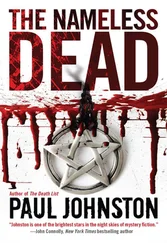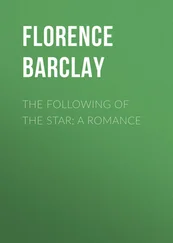Maureen Johnson - The Name of the Star
Здесь есть возможность читать онлайн «Maureen Johnson - The Name of the Star» — ознакомительный отрывок электронной книги совершенно бесплатно, а после прочтения отрывка купить полную версию. В некоторых случаях можно слушать аудио, скачать через торрент в формате fb2 и присутствует краткое содержание. Жанр: Старинная литература, на английском языке. Описание произведения, (предисловие) а так же отзывы посетителей доступны на портале библиотеки ЛибКат.
- Название:The Name of the Star
- Автор:
- Жанр:
- Год:неизвестен
- ISBN:нет данных
- Рейтинг книги:4 / 5. Голосов: 1
-
Избранное:Добавить в избранное
- Отзывы:
-
Ваша оценка:
- 80
- 1
- 2
- 3
- 4
- 5
The Name of the Star: краткое содержание, описание и аннотация
Предлагаем к чтению аннотацию, описание, краткое содержание или предисловие (зависит от того, что написал сам автор книги «The Name of the Star»). Если вы не нашли необходимую информацию о книге — напишите в комментариях, мы постараемся отыскать её.
The Name of the Star — читать онлайн ознакомительный отрывок
Ниже представлен текст книги, разбитый по страницам. Система сохранения места последней прочитанной страницы, позволяет с удобством читать онлайн бесплатно книгу «The Name of the Star», без необходимости каждый раз заново искать на чём Вы остановились. Поставьте закладку, и сможете в любой момент перейти на страницу, на которой закончили чтение.
Интервал:
Закладка:
I took a seat at one of the empty cubicles and spent several minutes setting it up. I plugged in my computer. I pinned my course syllabus to the cork wall and stared it down. Everyone else in this room was calmly carrying on. No one had, to my knowledge, read their course assignments and tried to escape through a chimney. I had been admitted to Wexford, and I had to assume that they didn’t do that just to be funny.
Wexford had a large assortment of books on Alexander Pope, so I headed off to the Literature Ol–Pr section, which was on the upper level and in the back. When I got to the aisle, I found a guy lounging right in the middle of it, on the floor, reading. He was in his uniform, but wore an oversized trench coat on top of it. He had really elaborate, bleached-blond, sticky-uppy hair formed into spikes. And he was singing a song.
Panic on the streets of London,
Panic on the streets of Birmingham . . . Sure, it was very romantic to lounge around in the literature section with big hair, but he was doing this in the dark. All the aisles had lights on timers. When you went into the aisle, you turned on the light. It clicked itself off after ten minutes or so. He hadn’t bothered to do this and was reading with just the scant amount of light coming from the window at the far end of the aisle. He didn’t move or look up, even when I had to stand right next to him and reach over him to get to the books. There were about ten books of collected works of Alexander Pope, which I didn’t need. I had the poem—I needed something to tell me what the hell it meant. Next to those were several books about Alexander Pope, but I had no idea which one I wanted. They were also very large. Meanwhile, the guy kept singing.
I wonder to myself,
Could life ever be sane again? “Excuse me. Could I ask you to move a little?” I said.
He looked up slowly and blinked.
“Are you talking to me?”
There was a dim confusion in his eyes. He tucked in his knees and spun around on his butt so that he was facing up at me. Now I understood what people meant by bluebloods—he was the palest person I had ever seen, a genuine grayish-blue in the light of the aisle.
“What are you singing?” I asked. I hoped he would take that as “please stop singing.”
“It’s called ‘Panic,’ ” he said. “It’s by the Smiths. There’s panic on the streets now, isn’t there? Ripper and all that. Morrissey’s a prophet.”
“Oh,” I said.
“What are you looking for?”
“A book on Alexander Pope, and I—”
“For what?”
“I have to read ‘An Essay on Criticism.’ I read it, I just don’t . . . I need a book about it. A criticism book.”
“Then you don’t want these,” he said, standing up. “They’re all rubbish. You’ll do far better with something that puts Pope’s work into context. See, Pope was talking about the importance of good criticism. All those books are just biographies with some padding. You want the general criticism section, which is over here.”
It seemed to take extraordinary effort for him to stand up. He pulled his coat tight and shied away from me a little. Then he gave a little jerk of his spiky head to indicate that I should follow him, which I did. He maneuvered around the gloomy stacks, turning abruptly a few aisles down. He didn’t turn on the light when we went in—I had to switch it on. He also didn’t need to scan for the section or book he was looking for. He walked right to it and pointed to the red spine.
“This one. By Carter. This one talks about Pope’s role in shaping the modern critic. And this one”—he indicated a green book two shelves down—“by Dillard. A little basic, but if you’re new to criticism, worth a read.”
I decided not to be resentful of the fact that he assumed I was “new to criticism.”
“You’re American,” he said, leaning against the shelf behind us. “We don’t normally get Americans.”
“Well, you got me.”
I wasn’t sure what to do next. He wasn’t talking; he was just staring at me as I held the book. So I flipped it open and started looking at the contents. There was an entire chapter on “An Essay on Criticism.” It was twenty pages long. I could read twenty pages if it helped me look less clueless.
“I’m Rory,” I said.
“Alistair.”
“Thanks,” I said, holding up the book.
He didn’t reply. He just sat down on the floor and folded his trench-coated arms and stared up at me.
The aisle light clicked off as I left, but he didn’t move.
It was going to take some time before I understood Wexford and its ways.
8
WHEN YOU LIVE AT SCHOOL, YOU GET CLOSE TO people really quickly. You never get away. You eat every meal with them. You stand in the shower line with them. You take class and play hockey with them. You sleep in the same place. You begin to see the thousand details of everyday life that you never catch when you just see people during school hours. Because you’re there constantly, school time moves differently. After only one week at Wexford, I felt like I’d been there for a month.
I realized I was popular back in Bénouville, I guess. I mean, not homecoming queen material, because that always went to a Professional Pageant Quality person. But my family was Old Bénouville, and my parents were lawyers, which meant that I was basically always going to be okay. I never felt out of place. I never lacked friends. I never walked into a class without feeling like I could speak up. I was of the place. I was home.
Wexford was not my home. England was not my home.
I was not popular at Wexford. I wasn’t unpopular either. I was just there. I wasn’t the brightest, though I managed to hold my own. But I had to work harder than I’d ever worked. I often didn’t know what people were talking about. I didn’t get the jokes and the references. My voice sometimes sounded loud and odd. I got bruised from the hockey balls and the hockey ball protection I wore.
Some other facts I picked up:
Welsh is an actual, currently used language and our nextdoor neighbors Angela and Gaenor spoke it. It sounds like Wizard.
Baked beans are very popular in England. For breakfast. On toast. On baked potatoes. They can’t get enough.
“American History” is not a subject everywhere.
England and Britain and the United Kingdom are not the same thing. England is the country. Britain is the island containing England, Scotland, and Wales. The United Kingdom is the formal designation of England, Scotland, Wales and Northern Ireland as a political entity. If you mess this up, you will be corrected. Repeatedly.
The English will play hockey in any weather. Thunder, lightning, plague of locusts . . . nothing can stop the hockey. Do not fight the hockey, for the hockey will win.
Jack the Ripper struck for the second time very early on September 8, 1888.
That last fact was hammered home in about seventeen thousand ways. I didn’t even watch the news and yet, news just got in. And the news really wanted us to know about the eighth of September. The eighth of September was a Saturday. And I had art history class on Saturday. This fact seemed much more relevant to my life, being unused to the idea of Saturday class. I had always assumed the weekend was a holy tradition, respected by good people everywhere. Not so at Wexford.
But our Saturday classes were our “art and enrichment classes,” which meant that they were supposed to be marginally less painful than the classes during the week, unless you hated arts or enrichment, which I suppose some people do.
Even though Jazza tried to wake me up on her way to the shower, and again on her way to breakfast, she succeeded only when she returned to the room to get her cello for music class. I fell out of bed as she hauled the massive black case out of the room.
Читать дальшеИнтервал:
Закладка:
Похожие книги на «The Name of the Star»
Представляем Вашему вниманию похожие книги на «The Name of the Star» списком для выбора. Мы отобрали схожую по названию и смыслу литературу в надежде предоставить читателям больше вариантов отыскать новые, интересные, ещё непрочитанные произведения.
Обсуждение, отзывы о книге «The Name of the Star» и просто собственные мнения читателей. Оставьте ваши комментарии, напишите, что Вы думаете о произведении, его смысле или главных героях. Укажите что конкретно понравилось, а что нет, и почему Вы так считаете.









